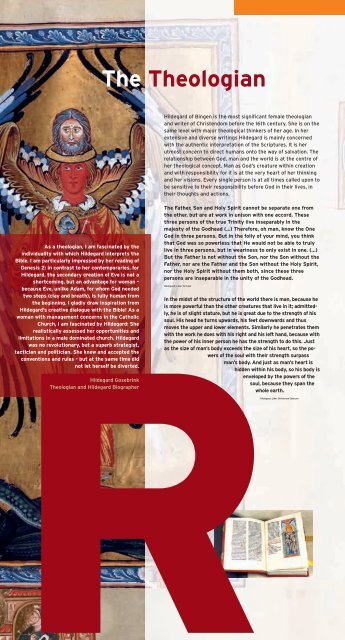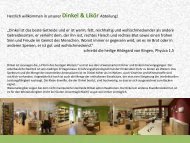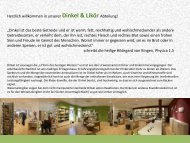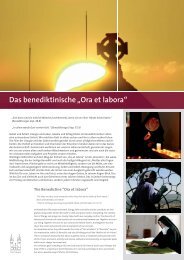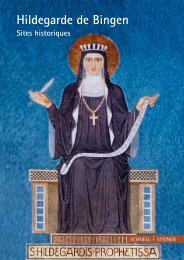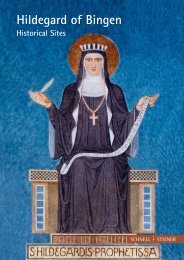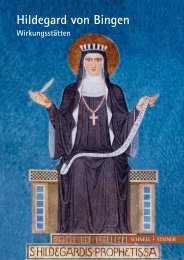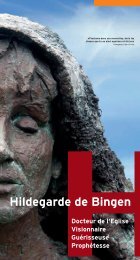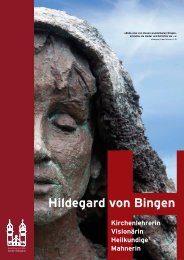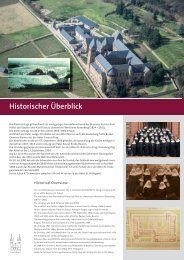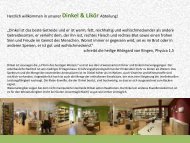hildegard_english_final
You also want an ePaper? Increase the reach of your titles
YUMPU automatically turns print PDFs into web optimized ePapers that Google loves.
The Theologian<br />
Hildegard of Bingen is the most significant female theologian<br />
and writer of Christendom before the 16th century. She is on the<br />
same level with major theological thinkers of her age. In her<br />
extensive and diverse writings Hildegard is mainly concerned<br />
with the authentic interpretation of the Scriptures. It is her<br />
utmost concern to direct humans onto the way of salvation. The<br />
relationship between God, man and the world is at the centre of<br />
her theological concept. Man as God’s creature within creation<br />
and with responsibility for it is at the very heart of her thinking<br />
and her visions. Every single person is at all times called upon to<br />
be sensitive to their responsibility before God in their lives, in<br />
their thoughts and actions.<br />
As a theologian, I am fascinated by the<br />
individuality with which Hildegard interprets the<br />
Bible. I am particularly impressed by her reading of<br />
Genesis 2: in contrast to her contemporaries, for<br />
Hildegard, the secondary creation of Eve is not a<br />
shortcoming, but an advantage for woman –<br />
because Eve, unlike Adam, for whom God needed<br />
two steps (clay and breath), is fully human from<br />
the beginning. I gladly draw inspiration from<br />
Hildegard’s creative dialogue with the Bible! As a<br />
woman with management concerns in the Catholic<br />
Church, I am fascinated by Hildegard: She<br />
realistically assessed her opportunities and<br />
limitations in a male dominated church. Hildegard<br />
was no revolutionary, but a superb strategist,<br />
tactician and politician. She knew and accepted the<br />
conventions and rules – but at the same time did<br />
not let herself be diverted.<br />
Hildegard Gosebrink<br />
Theologian and Hildegard Biographer<br />
The Father, Son and Holy Spirit cannot be separate one from<br />
the other, but are at work in unison with one accord. These<br />
three persons of the true Trinity live inseparably in the<br />
majesty of the Godhead (…) Therefore, oh man, know the One<br />
God in three persons. But in the folly of your mind, you think<br />
that God was so powerless that He would not be able to truly<br />
live in three persons, but in weariness to only exist in one. (…)<br />
But the Father is not without the Son, nor the Son without the<br />
Father, nor are the Father and the Son without the Holy Spirit,<br />
nor the Holy Spirit without them both, since these three<br />
persons are inseparable in the unity of the Godhead.<br />
Hildegard, Liber Scivias<br />
In the midst of the structure of the world there is man, because he<br />
is more powerful than the other creatures that live in it; admittedly,<br />
he is of slight stature, but he is great due to the strength of his<br />
soul. His head he turns upwards, his feet downwards and thus<br />
moves the upper and lower elements. Similarly he penetrates them<br />
with the work he does with his right and his left hand, because with<br />
the power of his inner person he has the strength to do this. Just<br />
as the size of man’s body exceeds the size of his heart, so the powers<br />
of the soul with their strength surpass<br />
man’s body. And just as man’s heart is<br />
hidden within his body, so his body is<br />
enveloped by the powers of the<br />
soul, because they span the<br />
whole earth.<br />
Hildegard, Liber Divinorum Operum


